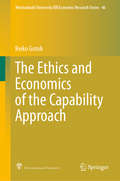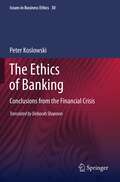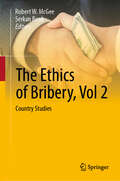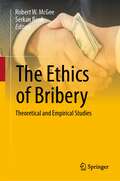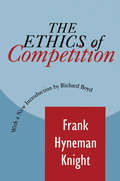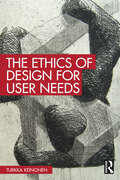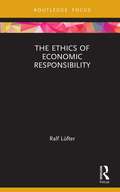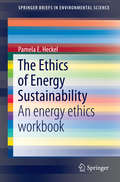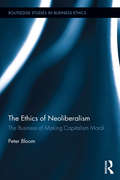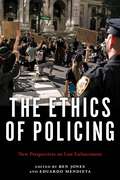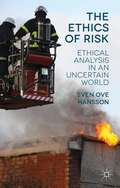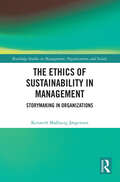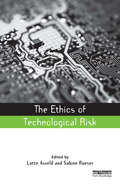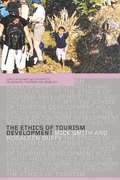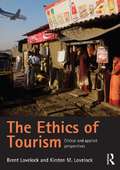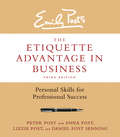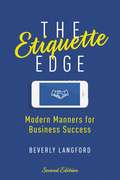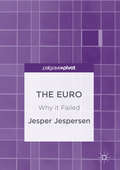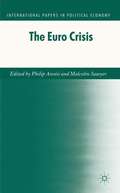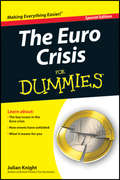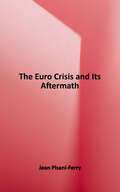- Table View
- List View
The Ethics and Economics of the Capability Approach (Hitotsubashi University IER Economic Research Series #46)
by Reiko GotohThis book inquires into the Capability Approach, a value theory of freedom, which crystalizes the interests of Marx, Welfare Economics, Social Choice, and Ethics. The capability approach has attracted many people as a promising interdisciplinary approach to human well-being and social worlds, finely overarching ethical and economic concerns. It has well challenged essential characteristics of welfare economics, which focuses on the criterion of efficiency with the concept of utility, by explicitly incorporating normative criteria such as agency, well-being and real freedom into positive analysis. However, it has a bit operational and methodological difficulties such that how to estimate an individual capability set which includes potential multi-dimensional functioning vectors. This book reminds the reader of what traditional economics has left behind, by examining historical backgrounds, scrutinizing philosophical foundations and providing an operational formulation of the capability approach: indispensable for understanding what the capability approach is about and what it can achieve.
The Ethics and Politics of Environmental Cost-Benefit Analysis (Routledge Explorations in Environmental Economics)
by Karine NyborgPutting a price tag on the environment is controversial. This book discusses ethical and political aspects of environmental cost-benefit analysis: why controversies must be expected, why they should be taken seriously, and how they can be handled in practice. Cost-benefit analysis is commonly thought of as a method for ranking projects according to their contributions to social welfare. The starting point of the present book is different. Rather than providing a final ranking, the purpose of a project analysis is to enable participants in a democratic decision-making process to make their own well-founded rankings of projects, according to their own normative views. Since ethical and political views differ, the analysis should be useful as factual background for any reasonable social welfare judgement. This purpose faces the analyst with quite different challenges than the purpose of ranking projects. The argument of the book is based on economic theory, but with a strong emphasis on readability and applicability. It is aimed at those – economists and non-economists alike – who use or are faced with cost-benefit analysis and environmental valuation in their work: politicians, employees of ministries and regulatory agencies, students, journalists, consultants and researchers. No particular prior knowledge of economics is required.
The Ethics of Banking: Conclusions from the Financial Crisis
by Peter KoslowskiThe Ethics of Banking analyzes the systemic and the ethical mistakes that led to the crisis. It keeps the middle ground between excusing all failures by the argument of a systemic crisis not to be taken responsibility for by the financial managers and the moralistic reproach that only moral failure is at the origin of the crisis. It investigates the role of speculation in the formation of the crisis and distinguishes between productive speculation for hedging and for securing market liquidity on the one hand, and unproductive and even detrimental hyper-speculation going far beyond of the degree of speculation that is necessary in a developed economy for the liquidity of financial markets, on the other hand. Hyper-speculation has increased the risks of the financial system and is still doing so.
The Ethics of Bribery, Vol 2: Country Studies
by Robert W. McGee Serkan BenkWhile most people assume that all bribery is unethical, the literature provides examples and philosophical arguments to support the proposition that some bribery may actually be ethical, based on utilitarian grounds. This book provides a theoretical and empirical examination of bribery from an ethical perspective. Complimentary to The Ethics of Bribery: Theoretical and Empirical Studies, this book offers a multi-country, multi-regional comparison to determine whether views toward bribery differ by geographic location. This includes case studies from USA, Japan, China, Russia, the MENA region, developed and developing countries, among others.
The Ethics of Bribery: Theoretical and Empirical Studies
by Robert W. McGee Serkan BenkWhile most people assume that all bribery is unethical, the literature provides examples and philosophical arguments to support the proposition that some bribery may actually be ethical, based on utilitarian grounds. This book provides a theoretical and empirical examination of bribery from an ethical perspective. It examines empirical data from over 80 countries and reports on attitudes toward bribery examining demographic variables such as gender, age, ethnicity, education, income level, religion and social class. Multi-country comparisons are provided to determine whether views toward bribery differ by geographic location.
The Ethics of Competition (Midway Reprint Ser.)
by Peter F. DruckerThe Ethics of Competition is a book of Frank H. Knight's writings on a common theme: the problem of social control and its various implications. Knight believed in free economic institutions but was also aware that the competitive economic system could be improved. One of the central figures of neoclassical economics in the twentieth century, Knight pursued a lifelong campaign against irrationalities of nationalism, religious fanaticism, and group conflict, while conceding that these were fundamental orientations of human action that might yet frustrate his own work as an economist. While Knight vigorously defended human freedom and the liberal order, he also was sufficiently moved by the shortcomings of liberalism as to condemn it as rife with abuse.As Richard Boyd writes in the new introduction, The Ethics of Competition is nothing short of visionary. Knight foresaw virtually all of the reductionistic tendencies that have come to plague the discipline he cultivated, neoclassical economic theory. Even more impressively, Knight related these disciplinary proclivities back to themes as grand as the fate of liberal democracy and human nature. Boyd discusses Knight's belief that the human craving for simple, mechanical explanations inevitably leads to frustration rather than material satisfaction. Chapters in The Ethics of Competition include "Economic Psychology and the Value Problem," "The Limitations of Scientific Method in Economics," "Marginal Utility Economics," "Fallacies in the Interpretation of Social Cost," and "Economic Theory and Nationalism." This volume will be of essential value to economists, political theorists, philosophers, and sociologists.
The Ethics of Design for User Needs
by Turkka KeinonenThis book offers an inquiry into the ethics of ‘human needs capture’ for design purposes by drawing upon ethical theories and narratives. Designers have historically relied upon the satisfaction of human needs as a moral justification for their profession. This volume offers an alternative critique to challenge this perspective, arguing that seeking to satisfy needs doesn't offer sufficient moral justification on its own. It presents an extensive ethical analysis of the notion of need and develops a thought-provoking case for a plural reconceptualisation of the notion of ‘need’ as user-based knowledge about product and service improvement opportunities. It does this by drawing upon a range of ethical approaches including Soran Reader’s needs ethics, classical utilitarianism, Robert Nozick’s libertarian philosophy, and John Rawls’ theory of justice. The book goes on to link these approaches to concepts guiding design such as human-centred design, collaborative design, and end user innovation. Written as a dialogue between a designer and his consciousness, the book underlines the deliberative nature of applied design ethics, and also highlights how consciousness challenges designers to solve their moral dilemmas. This engaging format invites readers to become an intimate part of the ‘discussion’. This book will be of interest to students and academics studying product design, industrial design, interaction design, user experience design, design ethics, and sustainable development.
The Ethics of Economic Responsibility (Economics and Humanities)
by Ralf LüfterThe Ethics of Economic Responsibility raises fundamental ethical questions related to the conceptualization of economic responsibility, that is: the imperative to fulfil certain economic obligations. It builds on a basic characterization of the question of ethics in order to introduce responsibility as a constitutive element for a new determination of economic knowledge. Drawing on the metaphysical tradition of philosophy, the book explores the distinction between "operability-based-responsibility" and "end-in-itself-based responsibility" and also considers what is tentatively called "being-related responsibility". By presenting these arguments about the notion of economic responsibility, the book contributes to the growing calls for ethical questions to not be merely complementary to the ongoing discourse of economic sciences, but rather to sit at its core, in such a way as to restore the intrinsic ethical dimension of economics itself. The book marks a significant contribution to the literature on the philosophy of economics, applied ethics more broadly, and the critical discourse concerning mainstream economics.
The Ethics of Energy Sustainability
by Pamela E. HeckelThis book is an easy to use instructional aide. Explore sustainability issues in contemporary society through a transdisciplinary approach. Chapters include ethics, public resources, public policy, combustion, heat exchangers, nuclear, solar, water, and wind energy. A short summary is presented for each topic, followed by additional topics for research, assignments, and references. The complex assignments require students to grow in their professional judgment.
The Ethics of Neoliberalism: The Business of Making Capitalism Moral (Routledge Studies in Business Ethics)
by Peter BloomThe 21st century is the age of "neo-liberalism" – a time when the free market is spreading to all areas of economic, political and social life. Yet how is this changing our individual and collective ethics? Is capitalism also becoming our new morality? From the growing popular demand for corporate social responsibility to personal desire for "work-life balance" it would appear that non-market ideals are not only surviving but also thriving. Why then does it seem that capitalism remains as strong as ever? The Ethics of Neoliberalism boldly proposes that neoliberalism strategically co-opts traditional ethics to ideologically and structurally strengthen capitalism. It produces "the ethical capitalist subject" who is personally responsible for making their society, workplace and even their lives "more ethical" in the face of an immoral but seemingly permanent free market. Rather than altering our morality, neoliberalism "individualizes" ethics, making us personally responsible for dealing with and resolving its moral failings. In doing so, individuals end up perpetuating the very market system that they morally oppose and feel powerless to ultimately change. This analysis reveals the complex and paradoxical way capitalism is currently shaping us as "ethical subjects". People are increasingly asked to ethically "save" capitalism both collectively and personally. This can range from the "moral responsibility" to politically accept austerity following the financial crisis to the willingness of employees to sacrifice their time and energy to make their neoliberal organizations more "humane" to the efforts by individuals to contribute to their family and communities despite the pressures of a franetic global business environment. Neoliberalism, thus, uses our ethics against us, relying on our "good nature" and sense of personal responsibility to reduce its human cost in practice. Ironically
The Ethics of Nuclear Energy
by Sabine Roeser Taebi, Behnam and Roeser, Sabine Behnam TaebiDespite the nuclear accident at the Fukushima Daiichi plant in Japan, a growing number of countries are interested in expanding or introducing nuclear energy. However, nuclear energy production and nuclear waste disposal give rise to pressing ethical questions that society needs to face. This book takes up this challenge with essays by an international team of scholars focusing on the key issues of risk, justice, and democracy. The essays consider a range of ethical issues, including radiological protection, the influence of gender in the acceptability of nuclear risk, and environmental, international, and intergenerational justice in the context of nuclear energy. They also address the question of when, and under which conditions, nuclear energy should play a role in the world's future supply of electricity, looking at both developing and industrialized countries. The book will interest readers in ethics and political philosophy, social and political sciences, nuclear engineering, and policy studies.
The Ethics of Policing: New Perspectives on Law Enforcement
by Edited by Ben Jones and Eduardo MendietaTop scholars provide a critical analysis of the current ethical challenges facing police officers, police departments, and the criminal justice systemFrom George Floyd to Breonna Taylor, the brutal deaths of Black citizens at the hands of law enforcement have brought race and policing to the forefront of national debate in the United States. In The Ethics of Policing, Ben Jones and Eduardo Mendieta bring together an interdisciplinary group of scholars across the social sciences and humanities to reevaluate the role of the police and the ethical principles that guide their work.With contributors such as Tracey Meares, Michael Walzer, and Franklin Zimring, this volume covers timely topics including race and policing, the use of aggressive tactics and deadly force, police abolitionism, and the use of new technologies like drones, body cameras, and predictive analytics, providing different perspectives on the past, present, and future of policing, with particular attention to discriminatory practices that have historically targeted Black and Brown communities. This volume offers cutting-edge insight into the ethical challenges facing the police and the institutions that oversee them. As high-profile cases of police brutality spark protests around the country, The Ethics of Policing raises questions about the proper role of law enforcement in a democratic society.
The Ethics of Risk
by Sven Ove HanssonWhen is it morally acceptable to expose others to risk? Most moral philosophers have had very little to say in answer to that question, but here is a moral philosopher who puts it at the centre of his investigations.
The Ethics of Sustainability in Management: Storymaking in Organizations (Routledge Studies in Management, Organizations and Society)
by Kenneth Mølbjerg JørgensenOrganizational storytelling has been taught for many years in many different places as part of organizational development, organizational change, organizational learning, and business ethics. There has not been any comprehensive framework that addresses sustainability in organizations and so this book develops a new ethics of sustainability for management and organizations. A terrestrial ethics of storymaking is proposed, which responds to Latour’s claim that the Terrestrial has become a new decisive political actor in politics. The Terrestrial is born from Gaia, a metaphor for a new look on life on Earth. Gaia situates life in the thin layer of matter that is the surface of the Earth. It entails the view that nature is a process that humans are part of. Storymaking is constructed from Arendt’s political philosophy, which is rooted ontologically in the principle of natality: rebirth of life. The term ‘storymaking’ is developed from Arendt’s understanding of storytelling as political action to emphasize not only that stories are spatial, embodied and material practices that are tied to a specific time and space but also that technology is an important dimension in making stories. Stories are thus human practices that apart from meaning making and politics involve the use and manipulation of material and objects, and which are crucial for how a human world is shaped. This human world is furthermore shaped by the rhythms of life embedded in the complex landscapes that humans move through. Storymaking is developed through rethinking the links between the central categories of labor, work, action, and thinking in Arendt’s writings. Implications for business ethics are drawn out and a comprehensive ethics framework is constructed that connects the biological and physical with the social, economic, and political regarding how organizations work. Finally, a storymaking philosophy of management is constructed, making this book especially relevant to researchers, academics, managers, and students in the fields of business ethics, management studies, leadership, organizational studies, and international business.
The Ethics of Tax Evasion
by Robert W. McgeeWhy do people evade paying taxes? This is the central question addressed in this volume by Robert McGee and a multidisciplinary group of contributors from around the world. Applying insights from economics, public finance, political science, law, philosophy, theology and sociology, the authors consider the complex motivations for not paying taxes and the conditions under which this behavior might be rationalized. Applying theoretical approaches as well as empirical research, The Ethics of Tax Evasion considers three general arguments for tax evasion: (1) in cases where the government is corrupt or engaged in human rights abuses; (2) where citizens claim inability to pay, unfairness in the tax system, paying for things that do not benefit the taxpayer, excessively high tax rates, or where taxes are used to support an unpopular war; and (3) through philosophical, moral, or religious opposition. The authors further explore these issues by asking whether attitudes toward tax evasion differ by country or other demographic variables such as gender, age, ethnicity, income level, marital status, education or religion. The result is a multi-faceted analysis of tax evasion in cultural and institutional context, and, more generally, a study in ethical dilemmas and rational decision making.
The Ethics of Technological Risk (Earthscan Risk in Society)
by Sabine Roeser Lotte Asveld'A comprehensive and important collection that includes essays by some of the leading figures in the field. ...Essential reading for anyone interested in risk assessment.' Professor Kristin Shrader-Frechette, University of Notre Dame 'The editors are to be congratulated for bringing together a distinguished international group of theorists to reflect on the issues. This volume will be sure to raise the level of debate while at the same time showing the importance of philosophical reflection in approaches to the problems of the age.' Professor Jonathan Wolff, University College London This volume brings together top authors from the fields of risk, philosophy, social sciences and psychology to address the issue of how we should decide how far technological risks are morally acceptable or not. The underlying principles are examined, along with methodological challenges, public involvement and instruments for democratization. A strong theoretical basis is complemented by a range of case studies from some of the most contentious areas, including medical ethics and GM crops. This book is a vital new resource for researchers, students and anyone concerned that traditional approaches to risk management don't adequately address ethical considerations.
The Ethics of Tourism Development (Contemporary Geographies of Leisure, Tourism and Mobility)
by Rosaleen Duffy Mick SmithDrawing upon a variety of important philosophical traditions, this book develops an original perspective on the relations between ethical, economic and aesthetic values in a tourism context. It considers the ethical/political issues arising in many areas of tourism development, including: the profound cultural and environmental impacts on tourist destinations the reciprocity (or lack of) in host-guest relations the (un)fair distribution of benefits and revenues the moral implications of issues such as sex tourism, staged authenticity and travel to oppressive regimes. The book concludes with a detailed investigation of the potential and pitfalls of ecotourism, sustainable tourism and community-based tourism, as examples of what is sometimes termed 'ethical tourism.'Until now, the ethical issues that surround tourism development have received little academic attention. Explaining philosophical arguments without the use of excessive jargon, this fascinating book interweaves theory and practice, aided by the use of text boxes to explain key terms in ethics, politics, and tourism development, and drawing on contemporary case studies from South Africa, Mexico, Zambia, Honduras, Ethiopia and Madagascar.
The Ethics of Tourism: Critical and Applied Perspectives
by Brent Lovelock Kirsten LovelockThere are increasingly strident calls from many sectors of society for the tourism industry, the world's largest industry, to adopt a more ethical approach to the way it does business. In particular there has been an emphasis placed on the need for a more ethical approach to the way the tourism industry interacts with consumers, the environment, with indigenous peoples, those in poverty, and those in destinations suffering human rights abuses. This book introduces students to the important topic of tourism ethics and illustrates how ethical principles and theory can be applied to address contemporary tourism industry issues. A critical role of the book is to highlight the ethical challenges in the tourism industry and to situate tourism ethics within wider contemporary discussions of ethics in general. Integrating theory and practice the book analyses a broad range of topical and relevant tourism ethical issues from the urgent 'big-picture' problems facing the industry as a whole (e.g. air travel and global warming) to more micro-scale everyday issues that may face individual tourism operators, or indeed, individual tourists. The book applies relevant ethical frameworks to each issue, addressing a range of ethical approaches to provide the reader with a firm grounding of applied ethics, from first principles. International case studies with reflective questions at the end are integrated throughout to provide readers with valuable insight into real world ethical dilemmas, encouraging critical analysis of tourism ethical issues as well as ethically determined decisions. Discussion questions and annotated further reading are included to aid further understanding. The Ethics of Tourism: Critical and Applied Perspectives is essential reading for all Tourism students globally.
The Etiquette Advantage in Business, Third Edition
by Peter Post Anna Post Lizzie Post Daniel Post SenningYour key to professional and personal successCompletely revised and updated, the third edition of the Posts' The Etiquette Advantage in Business is the ultimate guide professionals need to build successful business relationships with confidenceToday, more than ever, good manners mean good business. The Etiquette Advantage in Business offers proven, essential advice, from resolving conflicts with ease and grace to building productive relationships with colleagues at all levels. It also offers up-to-date guidance on important professional skills, including ethics, harassment in the workplace, privacy, networking, email, social media dos and don'ts, and knowing how and when to take responsibility for mistakes.For the first time in business history, four distinct generations inhabit the workplace at the same time, leading to generational differences that can cause significant tensions and relationship problems. The Etiquette Advantage in Business aims to help navigate conflict by applying consideration, respect, and honesty to guide you safely through even the most difficult situations.Written for professionals from diverse backgrounds and fields, The Etiquette Advantage in Business remains the definitive resource for timeless advice on business entertaining and dining etiquette, written communications, appropriate attire for any business occasion, conventions and trade shows, job searches and interviews, gift-giving, overseas travel, and more.In today's hyper-competitive workplace, knowing how to get along can make the difference between getting ahead and getting left behind. The Etiquette Advantage in Business provides critical tools for building solid, productive relationships and will help you meet the challenges of the work world with confidence and poise.
The Etiquette Edge: The Unspoken Rules for Business Success
by Beverly LangfordIntelligence, ambition, and skill will start you on the road to success, but without strong communications skills, social savvy, and a sense of appropriate behavior...you won't get far.The Etiquette Edge gives you a crash course on modern business manners. New advice explains how to navigate sticky situations at work, including digital interactions that are easy to misinterpret--and hard to mend. From interviewing etiquette and dress codes to working in close quarters and communicating upward, you'll master the essentials of making a great impression and building relationships, including how to:Be smart about how--and when--you use your smartphoneHandle difficult conversations with tact and finesseCheck texts and emails for content and toneCreate a polished image on social mediaConduct meetings (in person, online, or over lunch) with poise and confidenceAnd moreIn our era of entitlement, saying thank-you and giving praise are increasingly rare--but these simple acts are far from empty gestures. They're refreshing reflections of respect. Inconsiderate people and poor conduct may permeate the workplace, but success comes to those who play by a better set of rules.
The Euro
by Jesper JespersenThis book takes a close look at macroeconomic imbalances within the Eurozone and explores the profound consequences the introduction of the European Monetary Union (EMU) has had on Euro area countries. Particular attention is given to balance of payments deficits and surpluses, and the profound difficulties of rebalancing the Euro area. Throughout the chapters, the author argues that the EMU has failed to support an optimal currency area with the correct institutional arrangements due to misunderstandings at a macroeconomic level. The author also sheds light on the stability pact and the resulting macroeconomic trap which has left a number of Eurozone countries with devastatingly high rates of unemployment. The book argues that by disregarding important macroeconomic imbalances, Euro-monetarists have derailed the entire Eurozone project to such an extent that it is at risk of falling apart. Key chapters discuss the establishment of the EMU from a Euro-realist perspective and the role of the European Central Bank in rebalancing financial markets. The concluding chapter looks ahead to the future of the Euro and proposes necessary institutional solutions to the macroeconomic problems it is currently facing. Scholars and students with an interest in the current economic disarray within the Eurozone will find this work thought-provoking and highly informative.
The Euro Area and the Financial Crisis
by Miroslav Beblavý David Cobham L'Udovít ÓdorThe financial crisis of 2007-2010 has presented a number of key policy challenges for those concerned with the long-term stability of the euro area. It has shown that price stability as provided by the European Central Bank is not enough to guarantee financial stability, and exposed fault lines in governance and deficiencies in the architecture of the financial supervisory and regulatory framework. This book addresses these and other issues, including why the crisis affected some countries more than others, whether the euro is still attractive for new EU states, and what policy changes and structural reforms, both macro and micro, should be undertaken to ensure its future viability. Written by a team of leading academic and central bank economists, the book also includes chapters on the cross-country incidence of the crisis, the Irish crisis and ECB monetary policy during the crisis, and studies on Spain, the Baltics, Slovakia and Slovenia.
The Euro Crisis
by Philip Arestis Malcolm SawyerA detailed and informed analysis of the current crisis facing the eurozone, examining the root causes and exploring the possible outcomes and uncertain future of the European Union and its currency. Chapters include case studies of Portugal, Ireland, Spain and Greece, as well as broader comparative perspectives.
The Euro Crisis For Dummies
by Julian KnightYour handy mini-guide to the eurozone crisis These are turbulent times for Europe. The European debt crisis has dominated headlines, toppled elected leaders, and even called into question the survival of the Euro itself. In fact, not a day goes by without headlines screaming about the eurozone in crisis. But what are the key issues at stake? What exactly caused the crisis...and what might happen next? Julian Knight walks you through the issues and explains - in plain English - what the crisis means for you, and for the global economy. Open the book and find: How the crisis came about What it means to you Crystal ball predictions on what might happen next ‘Must know' facts about the crisis
The Euro Crisis and Its Aftermath
by Jean Pisani-FerryThe euro's life, while only slightly more than a decade long, has been riddled by a series of challenges and crises. The eruption of the Greek crisis in 2010 took European policymakers by surprise and forced them to design responses to a quickly deteriorating situation. Even though Europe has final begun to stabilize, the disparity between the prosperous Northern countries, especially Germany, and the plummeting Southern countries, including Spain and Greece, has exacerbated economic and political problems within the Eurozone. Amidst loud and frequent debates, solutions have been enacted, but the struggles facing this monetary union continue to develop even today. <p><p> The Euro Crisis and Its Aftermath was written to inform readers about the roots of this enduring European crisis and the alternative proposals for ending it. In four parts, Jean Pisani-Ferry explains the origins of the European currency, the build-up of imbalances and oversights that led to the crisis, the choices European policymakers have both addressed and ignored since 2010, and the evolution of the policy agenda and possible options for the future. The book is as much of an informative and analytical history as it is a discussion of solutions for a more prosperous European economy. <p><p> Rather than putting forth and supporting a thesis, Pisani-Ferry helps readers understand the past and present of the euro crisis and form their own opinions about potential solutions. This book is not intended to reach only economists, as time has long passed since European monetary unification was a debate limited to academics. This book is also for the policy makers searching for solutions, citizens of Europe enduring the consequences, and the international community that has felt the effects of an unstable Eurozone.
